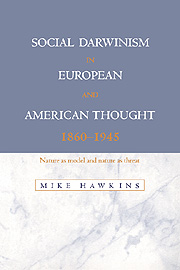Book contents
- Frontmatter
- Contents
- Acknowledgements
- Part I Defining Social Darwinism
- Introduction: the identity of Social Darwinism
- 1 Defining Social Darwinism
- 2 The distinctiveness of Social Darwinism
- Part II Pioneers
- Part III Case studies
- Postscript: Social Darwinism old and new: the case of sociobiology
- Bibliography
- Index
2 - The distinctiveness of Social Darwinism
Published online by Cambridge University Press: 07 December 2009
- Frontmatter
- Contents
- Acknowledgements
- Part I Defining Social Darwinism
- Introduction: the identity of Social Darwinism
- 1 Defining Social Darwinism
- 2 The distinctiveness of Social Darwinism
- Part II Pioneers
- Part III Case studies
- Postscript: Social Darwinism old and new: the case of sociobiology
- Bibliography
- Index
Summary
The Lamarckian world view
At this juncture I propose to explore the distinctiveness of Social Darwinism by comparing it, first, to the ideas of the French naturalist Lamarck, and second, to some earlier examples of evolutionary thought.
Jean Baptiste Lamarck (1744–1829) elaborated a systematic and influential account of evolution based upon a complex philosophy of life. Although Darwin publicly acknowledged Lamarck's contribution to the theory of evolution, he privately dismissed the Frenchman's work, claiming he had derived nothing from it. There may have been pragmatic reasons for repudiating Lamarck which will be considered below. Other contemporaries of Darwin certainly had a high opinion of Lamarck and I have already drawn attention to Darwin's own endorsement of ‘Lamarckian’ evolutionary mechanisms like the use and disuse of organs and the inheritance of acquired characters. Thus the relationship between the two theories is a matter of importance since some historians have suggested that what has been passed off as Social Darwinism would actually be far more accurately designated Social Lamarckism.
Lamarck's biological theory – he actually coined the word ‘biology’ in the early nineteenth century – was heavily influenced by the idéologues: late eighteenth-century French philosophers dedicated to the creation of a science of mankind. Lamarck extended their project by insisting that humans were part of nature and subject to its laws. Far from constituting a special creation, people differed only quantitatively from other creatures in that they possessed more complex faculties than animals but nothing uniquely human, including the ability to reason. In his Zoological Philosophy of 1809, Lamarck asserted the existence of an evolutionary progression from the simplest to the most complex forms of biological organisation.
- Type
- Chapter
- Information
- Social Darwinism in European and American Thought, 1860–1945Nature as Model and Nature as Threat, pp. 39 - 58Publisher: Cambridge University PressPrint publication year: 1997



